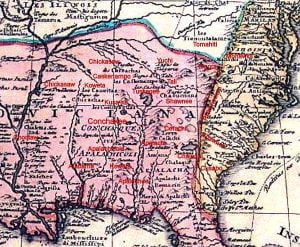Attacapan Family
Attacapan Family. A linguistic family consisting solely of the Attacapa tribe, although there is linguistic evidence of at least 2 dialects. Under this name were formerly comprised several bands settled in south Louisiana and northeast Texas. Although this designation was given them by their Choctaw neighbors on the east, these bands with one or two exceptions, do not appear in history under any other general name. Formerly the Karankawa and several other tribes were included with the Attacapa, but the vocabularies of Martin Duralde and of Gatschet show that the Attacapa language is distinct from all others. Investigations by Gatschet … Read more

